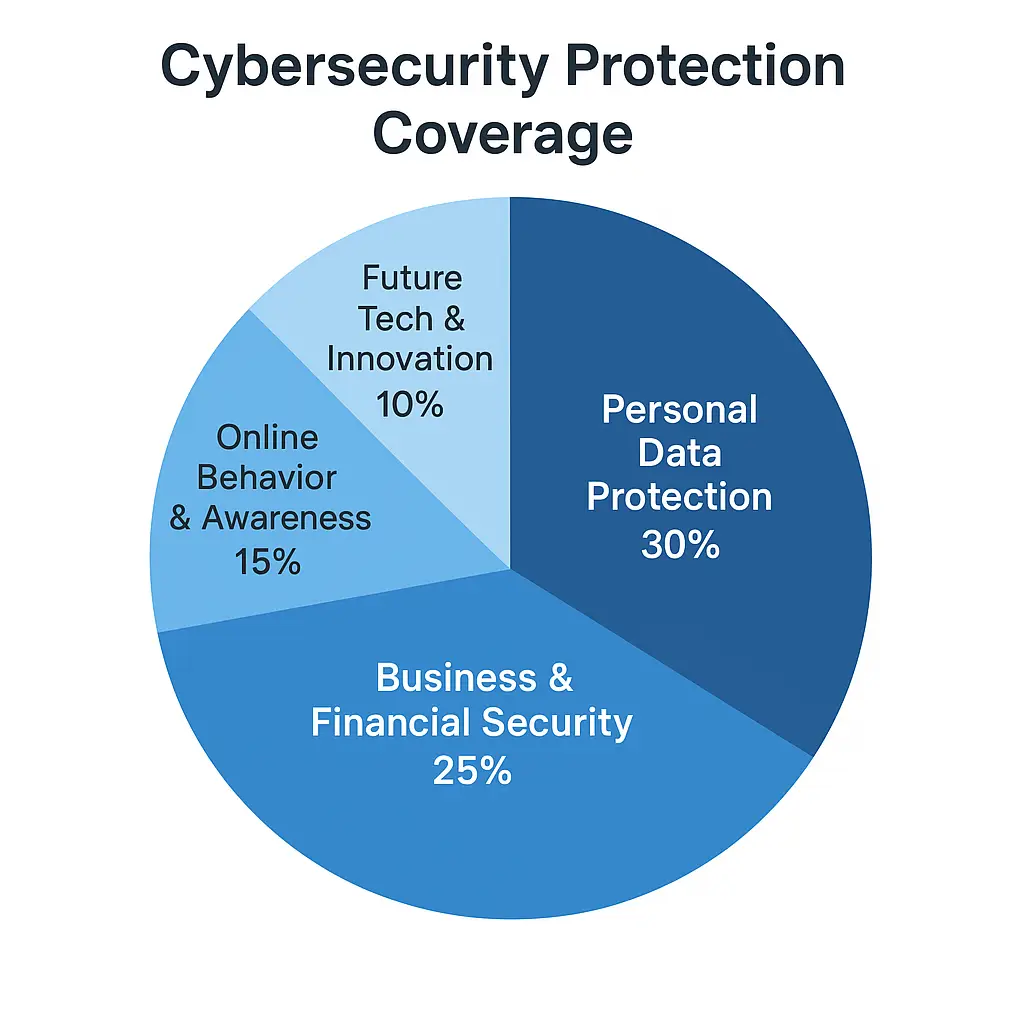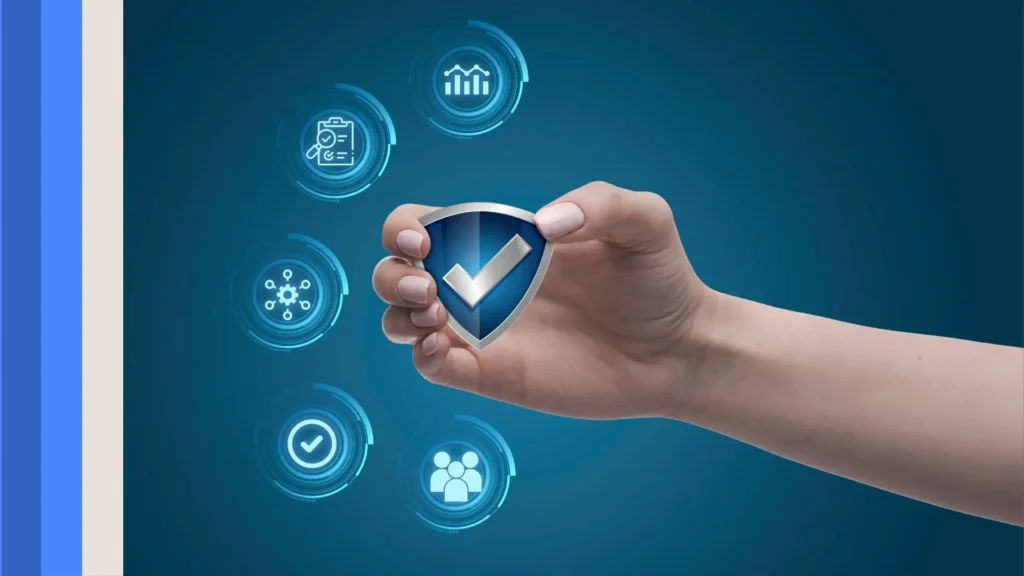In today’s highly connected world, we live much of our lives online. From shopping and banking to learning and working, the internet plays a vital role in our daily routines. However, as our digital presence grows, so do the risks. This is where cybersecurity becomes essential. Cybersecurity refers to the practices and technologies used to protect computers, networks, and data from unauthorized access or attacks. Let’s explore why cybersecurity is so important in this digital age.
- 1. The Digital Revolution and Its Risks
- 2. Protecting Personal Information
- 3. Safeguarding Businesses and Organizations
- 4. Preventing Financial Losses
- 5. Securing National Infrastructure
- 6. Rising Threats and Advanced Attacks
- 7. Cybersecurity in Education and Awareness
- 8. Encouraging Safe Online Behavior
- 9. The Future of Cybersecurity
- 10. Conclusion: Cybersecurity Is Everyone’s Responsibility
- FAQ’s
1. The Digital Revolution and Its Risks
The internet has simplified life more than ever before. Not only can we send money, but we also can also save files to the cloud and even control our appliances at home using our smartphones. However, along with these conveniences comes the other dark side. Criminals in the cyber world are always seeking opportunities to abuse and steal sensitive data. Such assaults may have serious consequences to persons, enterprises as well as governments.

To illustrate, one data breach is enough to give out the personal data of millions of users and result in their identity theft and the loss of their money. With the ongoing development of technology, methods of the cyber attackers are evolving as well. This renders cybersecurity as a primary concern of anyone.
2. Protecting Personal Information
One of the biggest functions of cybersecurity is the prevention of loss of personal data. Every time you sign up to a service, order something online or even visit a page, every single detail is being tracked down. This could include your name, address, phone number, credit card details and your place too.
The consequences can be catastrophic whereby this is information held by wrong individuals. Identity theft tends to occur due to the use of cyberattacks. Criminals can have access to bank accounts, obtain loans or even buy some other item using your name based on your personal information.
Effective cybersecurity tools such as the application of encryption and two-factor authentication can also come in handy when trying to ensure that your data is safe. Safeguarding your gadgets and accounts will reduce the possible danger of a legitimate third party logon.
3. Safeguarding Businesses and Organizations
Companies operate with vast bulk of data in the form of customer reports and payment related data, trade secrets as well as employee files etc. Cyberattack is an issue that may not only end up costing a company a lot of money but may also cost it lots of reputation.

Customers develop mistrust when they believe that their information cannot be kept secret by a company. This may be followed by loss of business and sales. What is more, companies can be fined by the law in case they cannot protect the data of their customers in accordance with the demands of the law.
Cybersecurity can help avoid these problems because it detects weak spots, resolves them, analyzes network traffic, and acts swiftly in case of possible threats. A lot of businesses are spending funds on cybersecurity specialists and systems so that their information and business process can stay clear of harm.
4. Preventing Financial Losses
The cost of cybercrime is so high. As it has been reported, cyberattacks represent a cost of billions of dollars every year to the international economy. This cost is incurred in various ways making them include the cost on repairing damage, ransom payments, legal expenses, and loss of business.
People are also subjected to financial loss. One phishing message can include a stolen bank password or credit card charge-off. It may therefore take time to recover these losses and in most instances these people may never recover their money.
Banking apps with security, fraud alerts and firewalls are key moments in protection of cybersecurity.
such losses. Being cautious online and adopting good digital habits also goes a long way.
5. Securing National Infrastructure
Cybersecurity does not only interest individuals and companies but also the safety of the whole countries. Governments use the digital systems in communication, defense, energy supply, transportation, and in ensuring the safety of the people.
An effective cyberattack against the critical infrastructure of a country including the power grid or water system can be catastrophic. It may interfere with services, cause panic and even physical injuries.
That is why governments across the globe are spending a lot in cybersafety. The agencies within national bodies to deal with cybersecurity are active 24/7 trying to identify hazards and prevent the possible attacks by both criminals and foreign parties.
6. Rising Threats and Advanced Attacks
Technology will always advance and so do cyber threats. The hackers have resorted to advanced methods of policies of attack such as the use of artificial intelligence, ransomware and spyware. Such contemporary techniques are more difficult to notice and prevent.
As an example, ransomware attack implies that hackers block its users and require payments, to unlock the system. Hospitals, schools, and other types of institutions have experienced such attacks, and it has shut down their services due to security threats to human life.
The number of devices that we have connected has also improved the entry points to a hacker, phones, smart TVs, cars, and even refrigerators. This is why it is even more crucial to keep on being informed about the recent cybersecurity practices.
7. Cybersecurity in Education and Awareness
Awareness is one of the most excellent methods of protecting yourself online. Numerous cyberattacks occur barely due to the fact that individuals are not able to realize indications of threat. It is easy to get in trouble by clicking on suspicious link, using weak passwords or even ignoring software updates.
That is why cybersecurity training is finding its way to school curriculums and workplace training. By educating the people about prevailing threats and methods of avoiding them, individuals will be able to be safe online.

Small precautions such as not giving out passwords, avoid unsecure websites and antivirus software can go a long way. Raising awareness in people about risks will encourage responsible behavior online.
8. Encouraging Safe Online Behavior
Digital good habits are also encouraged as a result of cybersecurity. Safe behavior on the internet enables the user to make the internet a safer place. This involves such things as:
- Maintenance of software and devices Update
- Avoiding chatty links or downloads
- Setting unqiue, difficult passwords to each account
- Activating privacy options in apps and web browser
- Remaining careful in terms of the information that you publish online
These are modest deeds but they are mighty. This makes life difficult to hackers when everyone plays his or her role.
9. The Future of Cybersecurity
More dependence on technology will be witnessed in future. As smart cities, self-driving cars and digital payments skyrocket, the importance of cybersecurity is going to gain even more weight. The use of artificial intelligence, machine learning, and blockchain already enabled increasing security systems.
Nevertheless, these technologies are being utilized to the benefit of hackers too. It implies that the war between hackers and hackers will go on. It is necessary to be constantly innovative, train and collaborate globally in order to be ahead of threats.
The services of cybersecurity workers are in demand at the present. They play a vital role in security not only of the data but also the safety and privacy of millions.
10. Conclusion: Cybersecurity Is Everyone’s Responsibility
In conclusion, it is necessary to say that cybersecurity is not only an issue of IT specialists or large organizations because it concerns us all. As a student, parent, businessperson, and government employee, being safe online is your daily endeavor.
With an increasingly more digital lifestyle, the danger will escalate. However, paying attention to cybersecurity by learning more about it, investing in it, and developing safe habits, we can minimize risks and as well as be able to take advantage of the benefits of the digital world without fear.
FAQ’s
Cybersecurity encompasses the process entailing defending computers, networks and information against online attacks such as hacking, malware and identity thefts. It is important since it ensures that personal, financial, and business information is not accessed by unauthorized people and unable to be destroyed.
Cybersecurity is something that everyone (physically, corporations, governments, and organizations) requires. You are a possible target of cyberattacks either you use a smartphone, run a company, or handle the sensitive data.
There are typical menaces associated with email phishing, ransomware, viruses, spyware, and data leaks. Such attacks would either steal any information, lock down your devices or destroy your digital systems.
The best way of reinforcing your cybersecurity can be done by:
Applying tough, distinctive passwords
Allowing two-factor authentication
Software Updates Commenting on what was required or needed in the future, the need to KEEP software UPDATED was mentioned.
Staying away of suspicious links and downloads
Setting of antivirus and firewall safeguards





